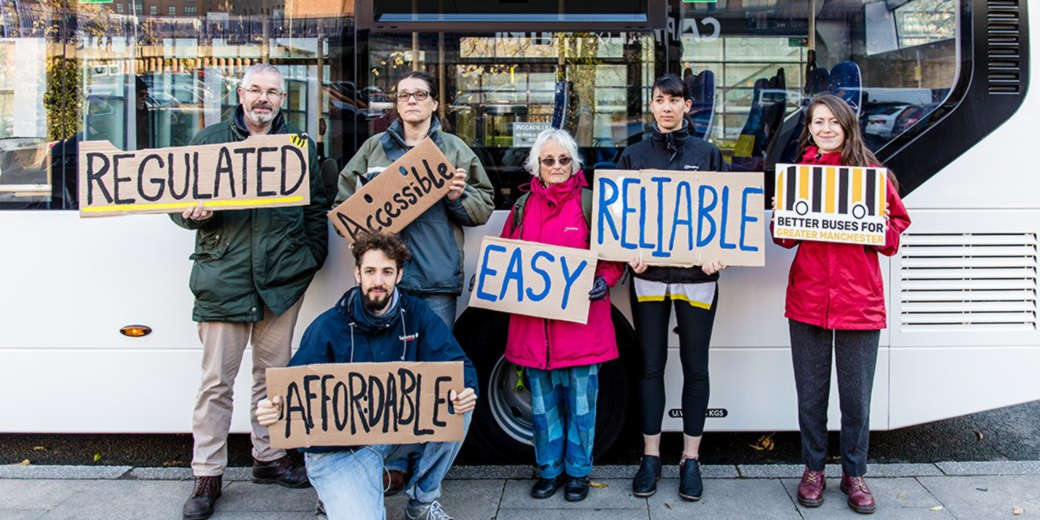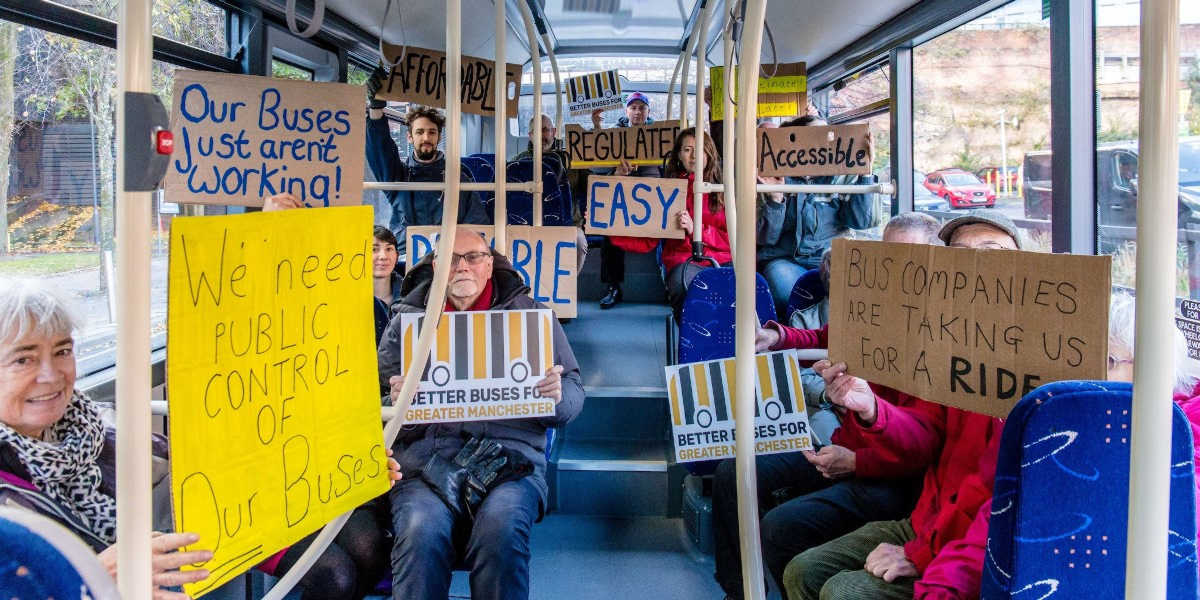Despite private bus companies doing everything in their power to stop regulation in its tracks, Manchester is bringing buses back into public control. This is a story of people coming together to demand better transport and winning, and it’s one that deserves a retelling.
In July this year, a high court ruling was upheld that declared the Greater Manchester local authorities’ move to franchising legal, following an appeal by bus company Rotala. As a result, in a year’s time local council leaders will have the power to set bus routes, fares and ticketing for the first time since the Thatcher government’s deregulation and fragmentation of the public network in the 1980s. Following the ruling, the region’s mayor Andy Burnham unveiled the ‘Bee Network’, a series of announcements building up to what’s billed as a London-style system of integrated transport underpinned by public control.
This would not have been possible without the sustained and coordinated pressure of local people, which took the form of the Better Buses for Greater Manchester campaign. Its success has laid down a blueprint, as follows, which has since been replicated across the north of England.
An active and unrelenting coalition
The campaign started by building a base: pulling together a broad coalition, which included renters, community organisations and trade unions, environmental and cycling campaigns, anti-poverty groups, faith groups and residents opposing bus route cuts in their areas. They met monthly, mapping a strategy towards the goal of getting Andy Burnham to commit to taking the buses into public control.
Big public meetings were held, organising people in each local authority in the city to put pressure on their council leader to demand change. They attended every public meeting possible as passengers wanting to speak to Burnham about the state of their buses, queued outside his office behind a fake bus stop, rolled out videos ripping the private companies’ records to shreds. They even linked up with Get Glasgow Moving, hosting their musical history of buses with roller skates. When a public consultation went live, the coalition organised a city-wide turnout – resulting in an overwhelming 80 per cent of respondents supporting public control.
The messaging was clear from the start: passengers deserve better buses, and that means public control. Combining direct action with sustained, mass pressure on every level of local government, drawing on the networks and members of different organisations and bringing them in with creativity and fun, they won.
Domino effect
Now, similar campaigns have launched to demand the same from metro mayors in North, South and West Yorkshire, as well as Liverpool. This has been spearheaded by We Own It, the Yorkshire TUC and the community union Acorn. It has inspired campaigners internationally, from Sweden to Ireland.
So what does this victory mean for public ownership of buses and our public services generally?
Since the start of the pandemic, bus companies have been paid £2 billion in subsidies to stay afloat while they axe routes anyway. This money could instead be reinvested in services
First, we must acknowledge that regulation isn’t a silver bullet. For the past 40 years, the dominant model of public provision has been to hand profits and power over to private companies, all while the public shoulders any risk and toothless government regulators hold the ensuing chaos loosely together. However, public control of buses is different to the ‘regulation’ of national utilities or services in that it gives local authorities clear powers to plan and oversee their local bus networks. This means that where there is a will – from communities and their elected local leaders – there is a way for local people to make sure they are the priority over profit.
Public control is also a meaningful step towards public ownership. But we’re not there yet, primarily because English local authorities are currently banned from setting up new municipally-owned bus companies. Even the power to franchise buses has tight controls placed on it. In England, only areas with devolution deals (such as a mayoral combined authority) can take control of their buses without having to ask Westminster – and they still have to jump through several legal hoops. Other authorities, county or unitary councils, have to apply to the transport minister for the power to even begin the process.
Only nine UK council-run bus companies survived the deregulation blitz of the 1980s, including the award-winning Lothian Buses in Edinburgh, Nottingham City Transport, and Reading Buses. Boris Johnson’s government admitted this ban is ‘ripe for review’ as part of its 2021’s ‘National Bus Strategy’, showing a potential way forward for campaigners to win more publicly owned buses. Any progress must build up to this.

Better Buses in Greater Manchester hold a protest
CREDIT: FOUNDATION FOR INTEGRATED TRANSPORT
Sustaining momentum and pressure
Now that Westminster is back to openly brandishing the double threat of trickle-down economics and austerity, however, significant pressure will be required to see a Conservative government move on the bus review any time soon.
The extent to which the Labour Party is able to act as a vehicle for this was finally clarified at its national conference this year, with shadow transport secretary Louise Haigh joining the Greens in calling for the lifting of the ban on new publicly-owned buses. This follows in the footsteps of Welsh Labour, with the Senedd using its devolved powers to steam ahead and begin planning the introduction of public control of buses across the country, with public ownership an option for councils. Holyrood has already reversed the ban for Scotland, but councils have yet to catch sight of the funding they need to seize the opportunity.
Since the start of the pandemic, bus companies have been paid £2 billion in public subsidies to stay afloat while they axe routes anyway. This money could instead be reinvested in services, stopping funds leaking away into shareholders’ pockets. The success of Andy Burnham’s London-style system will depend on avoiding replicating the funding war between Transport for London and the Department for Transport. Public ownership with proper funding must be the next stop.
A renewed political drive towards transport in public ownership has clearly gained momentum over the past few years. This has bubbled up from the local level, to the regional and national. Labour’s recent announcement that public ownership of rail and buses is party policy again marks a breakthrough following years of uncertainty. It is a testament to the enduring popularity of these policies (backed by two thirds of the public) and the growing number of communities taking action for them.
Campaigners are using a similar model to push for wins at a local level in the NHS, pressuring the chairs of England’s new ‘integrated care boards’ to commit to ending outsourcing. Some 11 of those chairs have already pledged to ban private companies from sitting on those boards, and now campaigners from Keep Our NHS Public and Unite Community are gearing up with We Own It to end specific contracts with private health companies in key battlegrounds, while also pushing for pledges to end outsourcing in each region.
Although our public services are at crisis point, the mass support for public ownership is stronger than
ever. The better buses movement has shown that when this is directed towards local action that wins real change for communities, demands grow and hope catches light. We must ensure that these victories are acknowledged not as politicians’ pet projects but the result of the public putting their feet to the fire and reclaiming the services they deserve.










